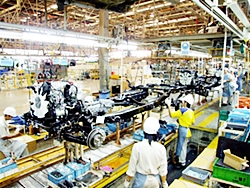BANGKOK, July 20 – A private sector survey has found that the proposed higher daily minimum wage of 300 baht (US$10) may lead to layoffs of some workers, according to the Federation of Thai Industries (FTI).
Payungsak Chartsutipol, chairman of the federation, said on Wednesday after a Joint Private Committee meeting to consider the impact of the Pheu Thai Party campaign promise to increase the daily minimum wage to 300 baht.

He said the private sector sees that the labourers’ quality of life and livelihood is important but it must be considered thoroughly, so employers, workers and the public ‘live in balance’.
Mr Payungsak said the committee disagreed with the planned nationwide increase as it would affect the country’s economy. However, it should be done based on the market mechanism and the tripartite committee but without political interference.
If the new government increases Thailand’s minimum wage to 300 baht per day, it should also figure out how to pay for the margin. When the new government is formed, the Joint Private Committee will submit its recommendation to the new government immediately, he said.
The chairman pointed out that labour-intensive industries – textiles, food processing, jewellery, furniture and footware manufacturing industries – would mostly feel the pinch from the wage hike.
The survey conducted among entrepreneurs on the impacts of the planned increase in the daily minimum wage showed that 60-70 per cent of employers will be negatively affected in the medium to high level. About 85 per cent of the respondents said they may have to lay off 15 per cent of their workers. Moreover, the survey found that it will affect the cost of production and entrepreneurs may have to raise goods’ prices by ten per cent.
Meanwhile, Dusit Nonthanakorn, chairman of Thailand’s Chamber of Commerce conceded that he was worried about the policy. The private sector agreed with the increased minimum wage, but it should be done at an appropriate level because in the short term, Thai businesses, mostly small- and medium-sized enterprises (SMEs) will be negatively affected by a higher minimum wage. Most entrepreneurs– 90 per cent — will not be able to shoulder the burden.
In the long term, wages in Thailand will be higher than those in neighbouring countries and Thailand will lose competitiveness in attracting foreign investment.
Currently, there Thailand has about Bt300-400 billion (US$10-13 million) in foreign investments. The increased minimum wage may cause investors to relocate their production base to other countries like Vietnam or Indonesia, leading to a 25 per cent loss of investment or about Bt100 billion ($3.3 million) per year. The rising cost will contribute to an increase in the prices of consumer goods.




